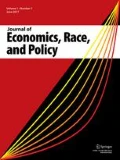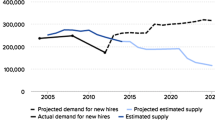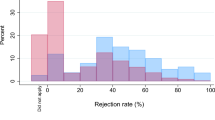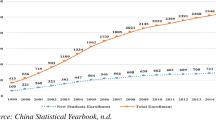Abstract
This study used Current Population Survey data to analyze the earnings of K12 teachers and postsecondary teachers in order to test competing hypotheses about racial disparities in educator labor markets. The analysis found African American educators, despite being purported to be in a condition of relative shortage, did not earn an appreciable wage premium in either of these two occupational groups. The wages of African American K12 teachers were not significantly different from their White counterparts, while African American postsecondary teachers earned a small and statistically significant wage discount. These findings align with historical and contemporary policy developments in educator labor markets as well as social network theory rather than the work of researchers such as Becker (1971), Arrow (1998), or Fisher and Houseworth (2011). These findings are important in light of research which suggests African American student achievement is positively impacted by the increased presence of African American professionals in schools. However, if disparate treatment exists in educational labor markets, African American professionals may be discouraged from pursuing careers in K12 or higher education. As such, a variety of policy solutions might be needed to bring the supply of African American educators up to the level of perceived societal need.
Similar content being viewed by others
References
Ai C, Norton E. A semiparametric derivative estimator in log transformation models. Health Econometrics and Data Group Working Paper. 2006.
Arrow K. What has economics to say about racial discrimination? J Econ Perspect. 1998;12(2):91–100.
Becker GS. The economics of discrimination. Chicago: The University of Chicago Press; 1971.
Bollinger CR, Hirsch BT. Match bias from earnings imputation in the Current Population Survey: the case of imperfect matching. J Labor Econ. 2006;24(3):483–519.
Brown, E. (2016). White teachers and black teachers have different expectations for black students. Washington Post.
Brown E. African American teachers’ experiences with racial micro-aggressions. Education Studies. 2019;55(6):180–96.
Charleston, L. and Jackson, J. (2017). Responding to the growth of diversity on American college campuses. Advancing equity and diversity in student affairs: a Festschrift in honor of Melvin C. Terrell, Information Age Publishing, 167-182.
Cheng DA. Teacher racial composition and exclusion rates among Black or African American students. Educ Urban Soc. 2017;51(6):822–47.
Coomer N. An investigation of the historical black wage premium in nursing. Rev Black Polit Econ. 2015;42(4).
D’Augelli AR, Hershberger SL. African American undergraduates on a predominantly White campus: academic factors, social networks, and campus climate. J Negro Educ. 1993;62(1):67. https://doi.org/10.2307/2295400.
Dantzler D. Black-White earnings and employment differences in the k-12 teaching labor market – potential impact on black males with learning disabilities. Journal of Research Initiatives. 2018;3(2):Article 6.
Dantzler D, Holmes P, Mcgregory R, Tardy T. Do Black-White earnings & employment differences exist in the K-12 teaching labor market in the United States? Journal of the Research Association of Minority Professors. 2014;16(1):70–80.
Du Bois WEB. Negroes in college. The Nation. 1926;3(3165):228–30.
Farinde AA, Allen A, Lewis CW. Retaining Black teachers: an examination of Black female teachers’ intentions to remain in K-12 classrooms. Equity Excell Educ. 2016;49(1). https://doi.org/10.1080/10665684.2015.1120367.
Fisher JD, Houseworth CA. The reverse wage gap among educated white and black women. J Econ Inequal. 2011;10(4):1–22. https://doi.org/10.1007/s10888-011-9167-2.
Foster, M. (1997). Black teachers on teaching. New York: The New Press.
Franklin, J. (2016). Racial microaggressions, racial battle fatigue, and racism-related stress in higher education. Journal of Student Affairs at NYU.
Gershenson, S., Hart, C., Lindsay, C., & Papageorge, N. (2017). The long-run impacts of same- race teachers. IZA Institute of Labor Economics. Discussion Paper No. 10630.
Gordon M. The black-white income differential over time: past trends and future prospects. Am Econ. 1984;82:57–62.
Harper, S., Patton, L. & Wooden, O. (2009). Access and equity for African American students in higher education: a critical race historical analysis of policy efforts. J High Educ, 80(4), 389–414. Retrieved from https://doi.org/10.1353/jhe.0.0052
Hawkins, D. B. (1994). Causalities: losses among Black educators were high after Brown. Black Issues in Higher Education, 10, 26–31.
Hrabowki F, Sanders M. Increasing racial diversity in the teacher workforce: one university’s approach. The NEA Higher Education Journal. 2015:101–15.
Hudson MJ, Holmes BJ. Missing teachers, impaired communities: the unanticipated consequences of Brown v. Board of Education on the African American teaching force at the precollegiate level. J Negro Educ. 1994;63(3):388–429.
Jackson T, Kohli R. Guest editors’ introduction: the state of teachers of color. Equity Excell Educ. 2016;49(1):1–8.
Karimi F, Matous P. Mapping diversity and inclusion in student societies: a social network perspective. Computers in Human Behavior Journal. 2018;88:184–94. https://doi.org/10.1016/j.chb.2018.07.001.
Karimi, Fariba, Génois, M., Wagner, C., Singer, P., & Strohmaier, M. (2017). Visibility of minorities in social networks. Gesis. Retrieved from http://arxiv.org/abs/1702.00150
Kezar A. Higher education change and social networks: a review of research. J High Educ. 2014;85(1):91–125. https://doi.org/10.1080/0021546.2014.11777320.
Kirk, M. (2017). The repercussions of the black teacher shortage. City Lab. Retrieved from https://www.citylab.com/equity/2017/08/black-taecher-shortage/536757/
Lemelle A. Social and economic organization of the black professoriate at predominately-white colleges and universities. J Afr Am Stud. 2010;14:106–27.
Lent, R. W., Sheu, H.-B., Singley, D., Schmidt, J. A., Schmidt, L. C., & Gloster, C. S. (2008). Longitudinal relations of self-efficacy to outcome expectations, interests, and major choice goals in engineering students. J Vocat Behav, 73, 328–335. Retrieved from https://doi.org/10.1016/j.jvb.2008.07.005
Madkins, T. C. (2011). The Black teacher shortage: A literature review of historical and contemporary trends. Journal of Negro Education, 80(3), 417–427.
Martin ND. Social capital, academic achievement, and postgraduation plans at an elite, private university. Perspectives. 2009;52(2):185–210. https://doi.org/10.1525/sop.2009.52.2.185.
McGregory R, Pulliam R. The Black Student Union: historical & contemporary developments. Whitewater: Center for the Study of Black Students; 2009.
National Public Radio (2018). Linda Brown, who was at center of Brown v. Board of Education, dies. Retrieved from https://www.npr.org/sections/thetwo-way/2018/03/26/597154953/linda-brown-who-was-at-center-of-brown-v-board-of-education-dies
Owens, E. Shelton, A. Bloom, C. Cavil, K. (2012). The significance of HBCUs to the production of STEM graduates: answering the call. Educational Foundations, 26, 33–47
Pew Research Center (2019). For black Americans, experiences of racial discrimination vary by education level, gender. Retrieved from https://www.pewresearch.org/fact-tank/2019/05/02/for-black-americans-experiences-of-racial-discrimination-vary-by-education-level-gender/
Rendón LI, Muñoz SM. Revisiting validation theory: theoretical foundations, applications, and extensions. Enrollment Management Journal. 2011.
Staples, B. (2017). Where did all the black teachers go? New York Times https://nyti.ms/2pFsRLZ
Taylor O, Apprey C, Hill G, McGrann L, Wang J. Diversifying the faculty. Peer Rev. 2010;12(3) Retrieved from https://www.aacu.org/publications-research/periodicals/diversifying-faculty.
Thomas, S. L. (2006). Ties that bind: a social network approach to understanding student integration and persistence. J High Educ, 71(5), 591. Retrieved from https://doi.org/10.2307/2649261
Toldson I. No BS (Bad Stats). Leiden: Brill Sense; 2019.
USA Today (2019). Blackface shows how deeply rooted antiblack racism is in America. Retrieved from https://www.usatoday.com/story/news/nation/2019/02/10/blackface-shows-how-deeply-rooted-antiblack-racism-america/2816801002/
Walker V. The lost education of Horace Tate. New York: The New Press; 2018.
Walker V. What black educators built. Educ Leadersh. 2019;76(7):12–8.
Warner, S. & Duncan, E. (2018). A vision and guidance for a diverse and learner-ready teacher workforce. Council of Chief State School Officers. Retrieved from https://ccsso.org/sites/default/files/2019-01/Vision%20and%20Guidance%20for%20a%20Diverse%20and%20Learner-Ready%20Teacher%20Workforce_FINAL010919.pdf
Author information
Authors and Affiliations
Corresponding author
Additional information
Publisher’s Note
Springer Nature remains neutral with regard to jurisdictional claims in published maps and institutional affiliations.
Rights and permissions
About this article
Cite this article
Wilson, D., Dantzler, D., Evans, D. et al. Do Racial Disparities Exist in the Labor Market for Educators?. J Econ Race Policy 3, 195–204 (2020). https://doi.org/10.1007/s41996-020-00055-0
Received:
Revised:
Accepted:
Published:
Issue Date:
DOI: https://doi.org/10.1007/s41996-020-00055-0




